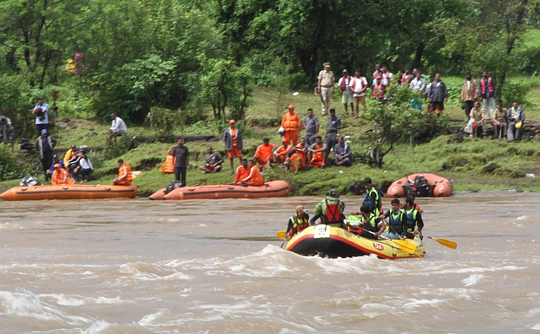Mahad, Aug 5: The Mahad tragedy is turning out to be huge one with 14 bodies having been recovered from Savitri river so far during search operations launched after two buses and some private vehicles got swept away following collapse of a British-era bridge on Tuesday night.

Chief Minster Devendra Fadnavis, however, said in the Legislative Assembly that 8 bodies were recovered so far and 42 people are missing.
"Fourteen bodies have been found today. Of them, three are of women and 11 of men. Most of the bodies were found within the periphery of 15 kms (from the site of bridge collapse), while the farther limit where some bodies were found is 45 kms.
"We have asked all villages located on the banks of the river to alert administration if they happen to spot any body floating in river," Raigad district Residential Deputy Collector, Satish Bagal told PTI tonight.
Raigad district Additional SP Sanjay Patil also confirmed that 14 bodies have been found so far.
Making a statement in Assembly in evening, the CM said, "Eight bodies have been found while 42 people are still missing in Mahad tragedy."
He said the government has decided to give Rs 5 lakh to kin of the deceased in the tragedy.
The government has already announced that the kin of the deceased staff members of two state-run buses would either be given job or compensation of Rs 10 lakh each.
Fadnavis said that apart from two state-run buses, a Tavera and a Honda City car had also fallen into river after the bridge crumbled on Tuesday night.
The British-era bridge is located on Mumbai-Goa Highway near Mahad, about 170 km from Mumbai.
Prima facie, the river, which turned into torrent due to heavy downpour in its catchment area in Mahabaleshwar, weakened the foundations of the nearly-century-old bridge, which ultimately gave way on Tuesday night.
Among the deceased whose bodies are found are Shrikant Kamble (53), who was at the wheel of Jaigad-Mumbai bus, and Rajapur-Borivali bus conductor, Prabhakar Baburao Shinde.
While Kamble's body was found at far away Anjarle in Ratnagiri district, that of Shinde was found at Kemburli near Mahad.
"The bodies of two women - Shevanti Mirgal and Sneha Baikar - who were travelling in Tavera car were recovered from Harihareshwar in Raigad district and at Rajewadi near Mahad respectively," Bagal said, adding that the body of the third woman, Ranjana Vaje, was recovered from Kemburli.
About 20 boats with nearly 160 personnel of Coast Guard, NDRF, and Navy, apart from local fishermen and rafters, are at the work to find the remains of the two buses and other vehicles, which are also suspected to have been swept away.
Earlier today, a 300-kg magnet was lowered in the waters with the help of a crane to trace the missing buses.
In the state Assembly, Fadnavis announced a judicial probe into the incident.
Opposition Leader Radhakrishna Vikhe Patil alleged the government machinery showed negligence which led to the tragedy.





Comments
Add new comment